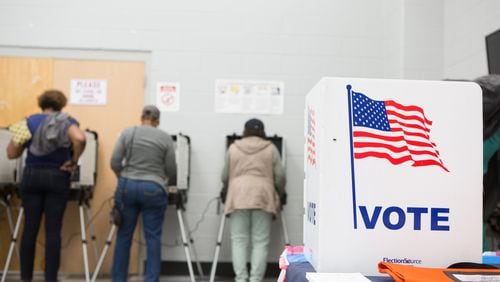Georgians who have completed their felony sentences but still owe money for restitution, fees and court costs are eligible to vote, according to a notice recently posted on the secretary of state’s website.
Felons still must pay off fines that are part of their court-ordered sentences before they can re-register to vote.
The clarification of voting rights for former criminals comes before Georgia’s Oct. 5 voter registration deadline, enabling them to participate in the presidential election.
The secretary of state’s office outlined voter eligibility in a short message on its voter registration website:
“Your felony sentence is considered completed even if you have outstanding monetary obligations other than fines, such as unpaid restitution, fees, costs, or surcharges,” according to the website.
The updated language was first reported by WABE-FM (90.1).
Figures aren’t available on how many people owe money for past crimes in Georgia, but it’s possible that tens of thousands of people who were uncertain about their eligibility now can know they’re allowed to vote, said Marissa Dodson, public policy director for the Southern Center for Human Rights.
There are about 248,000 felons currently serving sentences in Georgia.
“This clarification eliminates a lot of the barriers these people have faced. It opens up opportunities for people who had been left out of civic participation,” Dodson said Thursday.
The Georgia Constitution prohibits anyone who has been convicted of a “felony of moral turpitude” from registering to vote until their sentences are completed. Election officials and courts have interpreted the Constitution to mean that all felonies limit voting rights.
But it wasn’t previously explicit that restitution owed to victims or extra fees paid to the state didn’t disqualify someone from being able to vote after they completed the rest of a sentence.
“We made that update in working with felon re-entry organizations to try to provide simpler language to former offenders about how they can re-register to vote," said Deputy Secretary of State Jordan Fuchs. "We continue to invite all eligible citizens to exercise their right to vote in the upcoming election.”
Those who are uncertain whether they can vote can request a “Certificate of Sentence Completion” from a probation office.
Organizations that advocate for previously incarcerated Georgians will continue to advocate for changes to state laws that restore their voting rights, Dodson said.
State senators scuttled an effort last year to allow some nonviolent felons to vote while they’re paying off fines or on probation.
Re-enfranchisement of former felons has been hotly debated in Florida, where a federal appeals court recently ruled they’re ineligible to vote unless they’ve paid back all outstanding fines, fees and restitution.
About the Author








